
Undergraduate Student Spotlights
2022-2023
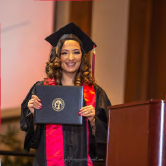
Excellence in Sociological Research
Elizabeth Castelo-Gil
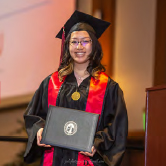
Excellence in Community Engagement
Emily Pham
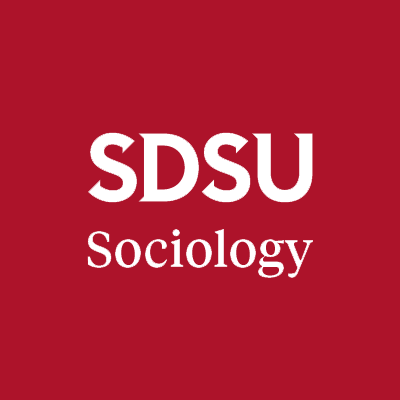
Outstanding Graduating Senior
David Trujillo
Gordon Clanton Scholarship Award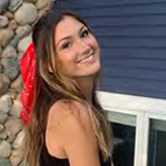
Emma Scout Kubow
As the recipient of the Gordon Clanton Scholarship Award, I got to work with the Del Mar Historical Society (DMHS) in researching and interviewing Monty C. Woolley. This award was funded by Del Mar Community Connections, which provides support to the Del Mar senior population through transportation, guidance, and social, cultural, health, and educational opportunities. This interview, as well as all of the Del Mar Oral Histories, are archived in a special section of the Del Mar branch of the San Diego County Library.
Over the few months that I worked with this group, I learned a great deal about the history of Del Mar and the factors and people that contributed to its growth. My main mentor through this, Annie Duval, took me on a driving tour of Del Mar and provided me with many resources to fully understand the history of this village.
At the end of March, I got to interview Monty with a comprehensive list of questions and probes that covered topics ranging from his childhood, pastimes, his family's role in Del Mar, and what he could recall of famous events that took place here. It was incredibly interesting to hear the life story of someone with 94 years of experience, history, and anecdotes. I cannot wait to read the official transcribed version at the Del Mar Library once it is published.
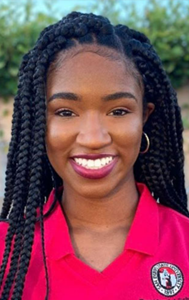 Amaya Childes
Amaya Childes
Outstanding Graduating Senior
About Amaya
Amaya Childes has been selected Sociology's Outstanding Graduating Senior of 2022. She joined SDSU in August 2019 and graduated Summa Cum Laude with a BA in Sociology, minor in Interdisciplinary Studies, and a certificate in Human Rights. Amaya was an outstanding student, being on the Dean’s List for each semester she has been at SDSU. Many faculty members have recognized Amaya as one of the top students that they had in their classes, always a focused and active participant, critically engaging with course materials. From her first year, Amaya has participated in a variety of student leadership positions, through the residential education halls, student government, and Greek life. She has been a Residential Advisor and Community Assistant under the Department of Residential Education Office and she has been recognized as Resident Advisor of the Month. She has been twice elected to the position of the Executive Vice President of the College of Arts and Letters Student Council. She also served as President of the Delta Gamma Chapter of Sigma Gamma Rho Sorority Incorporated, and holds an executive position on the National PanHellenic Council as well. Amaya has been involved in other services, as a member of the Mustard Seed Project, a member of Rotaract, and a volunteer of the BuildIT Center in the SDSU Library. As she has always been interested in working in public office, she worked as a Mayoral Intern in the Office of the Mayor, Todd Gloria, of San Diego. With her outstanding leadership experience and service for campus community as well as her excellent academic performance, Amaya has been selected for the 2022 Quest for the Best Award at SDSU. Amaya considers her experience in Dr. Minjeong Kim's research team as one of the most impactful experiences at SDSU. The team investigated racial representations of voice actors in popular animated films and she felt that her passion for sociological analysis peaked during this process.
Award Information
Chosen by the Department of Sociology Faculty
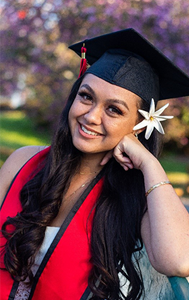 Alana Godoy
Alana Godoy
Outstanding Graduating Senior
Alana Godoy is graduating with honors earning a degree in both Anthropology and Sociology. A transfer student from Southwestern Community College, Alana is a member of Phi Theta Kappa Honors Society and Tau Sigma Honors Society. She is also on San Diego State University’s Mortar Board. While studying at SDSU, Alana has also been earning an associate degree in Hawaiian Studies from Windward Community College.
As the first person in her family to graduate from college, she hopes that she’s made her family proud and has set an example for her three younger siblings that they can accomplish whatever they put their heart and mind to.
Growing up as a Polynesian dancer, she has spent much of her life volunteering and staying active in San Diego’s Pacific Islander community. From 2017 to 2020, Alana served as Miss Pacific Islander of San Diego First Princess and Miss Charity, allowing her the opportunity to create several service projects, attend a variety of community events, and grant her with the financial support to continue pursuing higher education. She completed a fellowship in 2020 with APPEAL, the Asian Pacific Partners for Empowerment, Advocacy, and Leadership, advocating and promoting tobacco-free policies for AANHPI communities. As a Polynesian dancer, Alana has travelled with her dance group Kaleo Onalani, to Spain where they performed and taught workshops at the Pacific Islander Festival of Europe. Inspired by her work in the community, Alana created a YouTube channel and website called Sincerely, Alana, where she educates minority youth about current social issues, the effects of historical trauma, opportunities to pursue higher education, and promoting self-confidence.
Throughout her high school and college career, Alana has worked in a variety of corporate positions at several companies including Umpqua Bank, Guild Mortgage, the Asian Real Estate Association of America, and Maeva Tours. Despite enjoying roles such as executive assistant, event coordinator, and project manager, Alana finds more enjoyment in her roles as a nanny, travel agent, and content creator where she is able to educate, help, learn from, and connect with people from around the world.
 Diego Smith
Diego Smith
Award for Excellence in Sociological Research
 Jolyana Jirjees
Jolyana Jirjees
Award for Excellence in Community Engagement
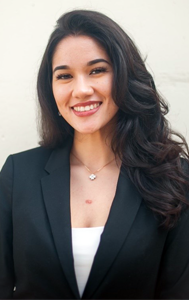 Abigail Tamayo
Abigail Tamayo
Award for Excellence in Community Engagement